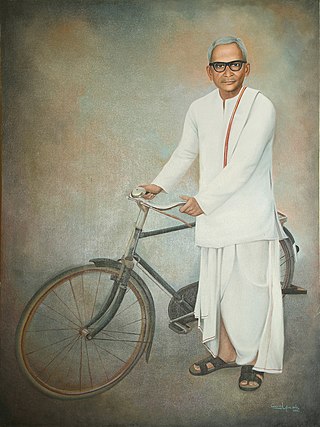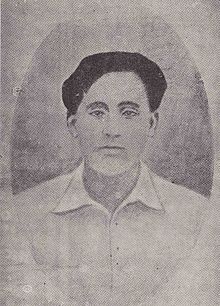
Mahadev Haribhai Desai was an Indian independence activist, scholar and writer best remembered as Mahatma Gandhi's personal secretary. He has variously been described as "Gandhi's Boswell, a Plato to Gandhi's Socrates, as well as an Ānanda to Gandhi's Buddha".

The Ahom or Tai-Ahom is an ethnic group from the Indian states of Assam and Arunachal Pradesh. The members of this group are admixed descendants of the Tai people who reached the Brahmaputra valley of Assam in 1228 and the local indigenous people who joined them over the course of history. Sukaphaa, the leader of the Tai group and his 9,000 followers established the Ahom kingdom, which controlled much of the Brahmaputra Valley in modern Assam until 1826.

The Quit India Movement was a movement launched at the Bombay session of the All India Congress Committee by Mahatma Gandhi on 8 August 1942, during World War II, demanding an end to British rule in India.

Golaghat district (Pron:ˌgəʊləˈgɑ:t) is an administrative district in the state of Assam in India. It attained district status in 1987. The district headquarters are located at Golaghat. The district occupies an area of3,502 km2 (1,352 sq mi) and lies 100 metres (330 ft) above sea level.

Abbas Tyabji was an Indian freedom fighter from Gujarat, and an associate of Mahatma Gandhi. He also served as the Chief Justice of Baroda State. His grandson is historian Irfan Habib.

Golaghat one of the largest subdivisions of the Indian state of Assam, later elevated to the position of a full–fledged district headquarter on 5 October 1987, is a city and a municipality and the seat of administrative operations of Golaghat district, besides being a twin city to Jorhat which is about 55 km away. It is one of the oldest urban areas in Assam that recently featured on the Smart Cities nominations list, along with Guwahati and four other prominent urban areas of the state; although losing out to Guwahati at the final stage. The Dhansiri, one of the tributaries of the Brahmaputra, passes through Golaghat and is the primary water source for its citizens.

Jorhat is an administrative district of the Indian state of Assam situated in the central part of the Brahmaputra Valley. The district is bounded by Majuli on north, Nagaland state on the south, Sivasagar on the east and Golaghat on the west. On the north of the district, the river Brahmaputra forms the largest riverine island of the world. The administrative seat is at Jorhat city.

Kunwar is an Indian Royal title denoting a prince. It is derived from the Sanskrit word Rajkumar. It was traditionally associated with the feudal Rajputs such as the son of a Rana, Babu and Thakur

Upper Assam is an administrative division of the state of Assam comprising the undivided Lakhimpur and Sivasagar districts, of the upper reaches of the Brahmaputra valley. The other divisions are: Lower Assam, North Assam and Hills and Barak Valley. The division is under the jurisdiction of a Commissioner, stationed at Jorhat.
Participation of Mangalorean Catholics in the Indian Independence Movement recounts the community's role in the Indian Independence Movement.
Phukan or Phookan or Phukon is a surname of assamese origin and a Paik officer. Now the descendants' clans use it as a surname. This is usually used among the people of Assamese origin and others.

Gomdhar Konwar, a prince of the Ahom royal family of Assam, known for having led one of the first revolts against the British in India. Konwar was declared the last King of Assam.

Kunwar ) is a title denoting the Prince.
Assam – 16th largest, 15th most populous and 26th most literate state of the 28 states of the democratic Republic of India. Assam is at 14th position in life expectancy and 8th in female-to-male sex ratio. Assam is the 21st most media exposed states in India. The Economy of Assam is largely agriculture based with 69% of the population engaged in it. Growth rate of Assam's income has not kept pace with that of India's during the Post-British Era; differences increased rapidly since the 1970s. While the Indian economy grew at 6 percent per annum over the period of 1981 to 2000, the same of Assam's grew only by 3.3 percent.

Biswanath is an administrative district in the state of Assam in India. It is one of newly created district in the year by 2015, declared by Assam Chief Minister Tarun Gogoi on 15 August 2015.

Omeo Kumar Das, popularly addressed as Lok Nayak, was an Indian social worker, Gandhian, educationist, writer and a former minister at the Government of Assam. He held various ministerial portfolios such as Education, Labour and Food and Civil Supplies, during various periods, in the state of Assam. He translated The Story of My Experiments with Truth, the autobiography of Mahatma Gandhi, into Assamese language and contributed to the implementation of Tea Plantation Worker’s Provident Fund in the state. The Government of India awarded him the third highest civilian honour of the Padma Bhushan, in 1963, for his contributions to society. India Post honoured Das by issuing a commemorative stamp on him on 15 May 1998.
Babu Chotelal Srivastava was a freedom fighter in the area that would later become Chhattisgarh. He was born on 28 February 1889 in Kandel. His participation in national movements began after he met Pt. Sundarlal Sharma. In 1915, he established the Srivastava Library. His house in Dhamtari was a major center of the freedom struggle in the Indian independence movement. He was also among the principal organizers of the Dhamtari Tehsil Political Council in the year 1918. Chhotelal Srivastava was most famous for organizing the Kandel Nehar Satyagraha, a rebellion against the British Raj.

Chowdary Satyanarayana, also known as Jananayaka Chowdary Satyanarayana, was an Indian freedom fighter, anti-colonial nationalist, politician, legislator in Andhra Pradesh Assembly and a civil rights activist.
Tanu Konwar was an Indian-Assamese politician and the founder principal of Gargaon College, which was established in the year 1959. He was elected to the Assam Legislative Assembly in 1988 from Nazira constituency. He is also the father of Diganta Konwar, former member of the 11-membered People's Consultative Group (PCG) established by the United Liberation Front of Assam(ULFA).
Nagen Neog was an Indian politician from the state of Assam. He served as Member of Assam Legislative Assembly for Golgahat and as Rural Development Minister in the Hiteswar Saikia Cabinet until his assassination. He was the husband of the current Finance minister of Assam, Ajanta Neog, and son in law of MLA Rebati Das.













